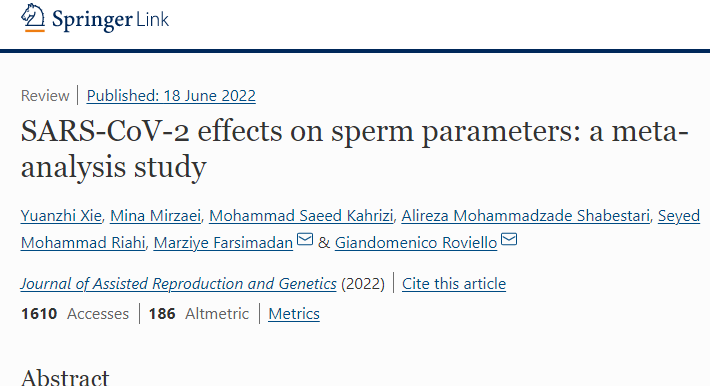Abstract
Aim
The rapid outbreak of the coronavirus disease 2019 (COVID-19) pandemic posed challenges across different medical fields, especially reproductive health, and gave rise to concerns regarding the effects of SARS-CoV-2 on male infertility, owing to the fact that the male reproductive system indicated to be extremely vulnerable to SARS-CoV-2 infection. Only a small number of studies have investigated the effects of SARS-CoV-2 on male reproduction, but the results are not consistent. So, we performed this meta-analysis to draw a clearer picture and evaluate the impacts of COVID-19 on male reproductive system.
Method
We searched Embase, Web of Science, PubMed, and Google Scholar databases to identify the potentially relevant studies. Standardized mean difference (SMD) with 95% confidence interval (CI) was applied to assess the relationship. Heterogeneity testing, sensitivity analysis, and publication bias testing were also performed.
Results
A total of twelve studies including 7 case control investigations and 5 retrospective cohort studies were found relevant and chosen for our research. Our result showed that different sperm parameters including semen volume [SMD = − 0.27 (− 0.46, − 1.48) (p = 0.00)], sperm concentration [SMD = − 0.41 (− 0.67, − 0.15) (p = 0.002)], sperm count [SMD = − 0.30 (− 0.44, − 0.17) (p = 0.00)], sperm motility [SMD = − 0.66 (− 0.98, − 0.33) (p = 0.00)], and progressive motility [SMD = − 0.35 (− 0.61, − 0.08) (p = 0.01)] were negatively influenced by SARS-CoV-2 infection. However, sperm concentration (p = 0.07) and progressive motility (p = 0.61) were not found to be significantly associated with SARS-CoV-2 infection in case control studies. No publication bias was detected.


